LINDA RONSTADT in Tucson
THE SINGER'S ARIZONA REFUGE EXPRESSES HER LOVE FOR TRADITION

|
LEFT:
A 1928 Mediterranean-style house in Tucson, Arizona, is home
to entertainer Linda Ronstadt and her two children. Interior designer
Christy Martin started the project over seven years ago. "It's ongoing -
Linda loves to change things all the time," Martin says.
|
from ARCHITECTURAL DIGEST, October 2004
Interior Design by Christy Martin of Studio Encanto/
Text by Peter Haldeman/
Photography by Robert Reck
Like Madonna or Cher, Linda Ronstadt is a performer
whose public incarnations evoke whole eras. What could be more '60s than Ronstadt
slapping a tambourine against her miniskirt to the beat of the Stone Poneys?
More '70s than her album Heart Like a Wheel - or her affair of the heart with
California governor Jerry Brown? More '80s than her Broadway
stint with Rex Smith in The Pirates of Penzance?
 Professionally speaking, the singer has continued to experiment over the last two decades
or so, mastering musical styles from orchestral pop to traditional Mexican. Personally,
however, she's as tradition-bound as they come. Ronstadt has two adopted kids now, and
several years ago the three of
them quit California for Tucson, Arizona. "I decided to raise my children there because
they have more dirt," says Ronstadt, "as opposed to concrete." Tucson is where her father
ran Ronstadt's Hardware, where her grandfather once managed a sprawling cattle ranch and
where, on the remaining 10 acres of that ranch, she grew up. "That sense of place," she
points out, "is something very hard to come by these days."
Professionally speaking, the singer has continued to experiment over the last two decades
or so, mastering musical styles from orchestral pop to traditional Mexican. Personally,
however, she's as tradition-bound as they come. Ronstadt has two adopted kids now, and
several years ago the three of
them quit California for Tucson, Arizona. "I decided to raise my children there because
they have more dirt," says Ronstadt, "as opposed to concrete." Tucson is where her father
ran Ronstadt's Hardware, where her grandfather once managed a sprawling cattle ranch and
where, on the remaining 10 acres of that ranch, she grew up. "That sense of place," she
points out, "is something very hard to come by these days."
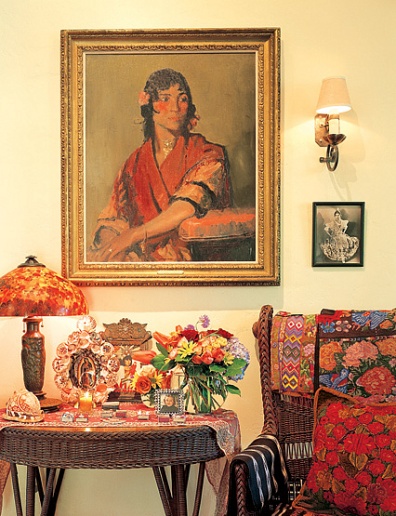 In an old central Tucson neighborhood laid out by a student of Central Park designer
Frederick Law Olmsted, Ronstadt found a pink stucco Mediterranean-style house built by
Roy Place in 1928. "I fell in love with it when I saw it because it had this tile in the
study that reminded me of my father's room in our old house," she says. "And I think I've
met almost everyone that's lived in the house. I know the family that built it and the
daughter of the family that
grew up in it. So it's always felt like a house that was loved." The place was in good
hape when the singer acquired it, but it was slightly cramped after her three-story
residence in San Francisco. "None of my furniture fit. The house has lots of doors and
windows, and I couldn't figure out where to put anything."
In an old central Tucson neighborhood laid out by a student of Central Park designer
Frederick Law Olmsted, Ronstadt found a pink stucco Mediterranean-style house built by
Roy Place in 1928. "I fell in love with it when I saw it because it had this tile in the
study that reminded me of my father's room in our old house," she says. "And I think I've
met almost everyone that's lived in the house. I know the family that built it and the
daughter of the family that
grew up in it. So it's always felt like a house that was loved." The place was in good
hape when the singer acquired it, but it was slightly cramped after her three-story
residence in San Francisco. "None of my furniture fit. The house has lots of doors and
windows, and I couldn't figure out where to put anything."
Her quandary led her to Studio Encanto, a neighborhood establishment run by interior
designer Christy Martin. "She just waltzed into the shop one day and said that she was
looking for a decorator and had heard I was the best in town," recalls Martin.
"My mouth kind of dropped open. I said thank you and pretended I didn't know who she was."
Martin not only knew who the entertainer was, her former husband had been the last
tenant of Ronstadt's new house.
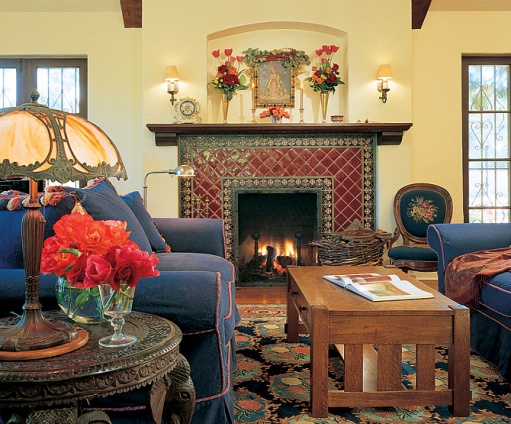 Their first project together was redoing the children's bedrooms - Ronstadt's daughter
got a star-spangled ceiling; her son, a cowboy motif. Then they turned their attention
to the singer's own bedroom, placing her bed on the diagonal to make room for a
gingerbread-trimmed mantel that Ronstadt had purchased in L.A. Martin, along with
Tucson-based architect Bob Vint, oversaw construction of a new master bath
(and a breakfast room below), taking pains to see that its arches and tiles and fixtures
matched the period details of the rest of the house.
Their first project together was redoing the children's bedrooms - Ronstadt's daughter
got a star-spangled ceiling; her son, a cowboy motif. Then they turned their attention
to the singer's own bedroom, placing her bed on the diagonal to make room for a
gingerbread-trimmed mantel that Ronstadt had purchased in L.A. Martin, along with
Tucson-based architect Bob Vint, oversaw construction of a new master bath
(and a breakfast room below), taking pains to see that its arches and tiles and fixtures
matched the period details of the rest of the house.
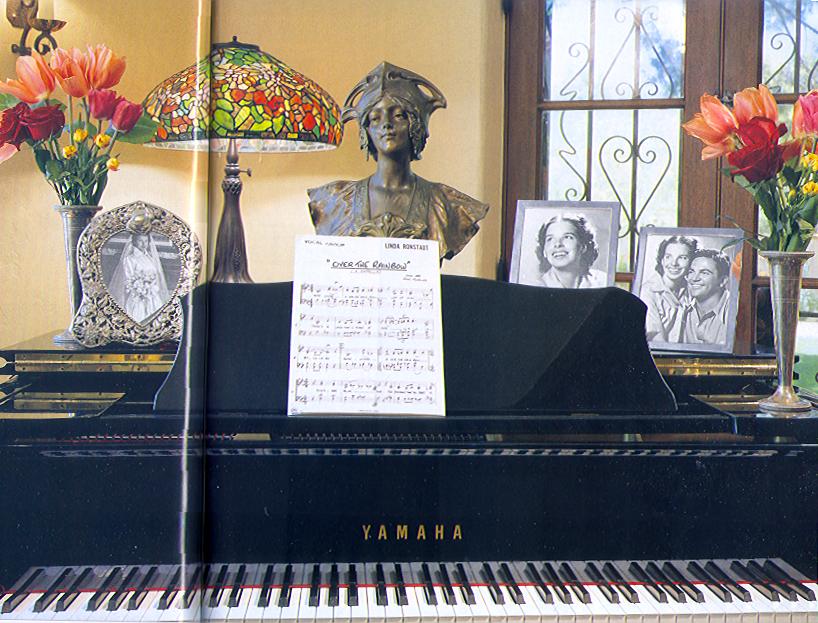
Above: The sheet music for "Over the Rainbow," arranged for Ronstadt by Gene Puerling, is
displayed on the piano
in the living room. Photographs of Ronstadt's parents, taken by
celebrated Hollywood portraitist Lansing Brown,
are to the right of an Art Nouveau bust.
Decorating meant "finding a way to use the things I've had all my life," says Ronstadt.
"I've always traveled, and I'd see stuff when I'd be on the road in Tennessee or
Massachusetts or Canada. I'd bring it home, and it would either go into storage or
in a corner of wherever I was living at the time, next to the open suitcase." These
acquisitions now mingle with a rich accumulation of family keepsakes. There are Handel
lamps; seashelladorned shrines purchased at gas stations; an aquatint by Mary Cassatt;
a needlepoint chair found on the streets of San Francisco; a china clock from her grandmother
that survived the 1989 Lorna Prieta earthquake; paintings that Maynard Dixon gave her father
in exchange for well water. "She's not pretentious at all," says the designer. "She has
things that are wonderful - and then the daybed will be out of a catalogue."

The breakfast room, part of a two-story addition by
architect Bob Vint, opens to a covered seating area outside. "Roy Place, Tucson's
premier architect in the 1920s, designed the house, and it was important to respect
his original intent while creating more space," Vint says.
|
|
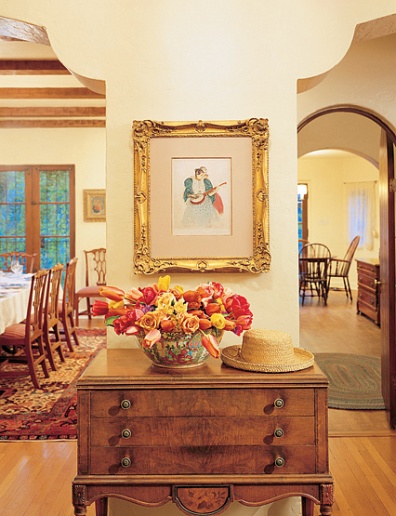
The Banjo Lesson, an early-20th-century aquatint by
Mary Cassatt, hangs in the entrance hall above a circa 1920 silver chest that
once belonged to Ronstadt's maternal grandmother. "Linda loves fresh flowers,
and she places them all over the house," says Martin.
|
Over time the two selected fabrics and paint colors to complement these pieces as well as
local finds. "Tucson has secondhand stores, not highend antiques stores," says Ronstadt,
"but if you haunt the secondhand places, you can find treasures." A prime discovery came
from the estate of a family friend - an old pump organ that her son likes to play. "I won't
have anything that's just decorative," says the singer. "Things have to function in my house,
because it's small." That includes the fine linens, china and silver she collects. "The house
I grew up in wasn't fancy, but my mother had her wedding silver, and we used it all the time.
And I do that here. I have blue willow and blueand-white stuff from all over the country
that we eat breakfast off of every day."
The family traditions extend to the garden, where Ronstadt tends to her jasmine and roses,
citrus and olive trees, in the "by guess and by golly" manner of her father. She stocks
the house with cut flowers and cures her own olives, and the descendants of her father's
Araucana chickens provide eggs. The chickens wander the grounds with a full complement of
pets. "You have to imagine the house with a little white dog, a big Lassietype dog and
three cats roaming around," says Martin. "Kids running in and out, the phone ringing -
it's a very, very lively household."
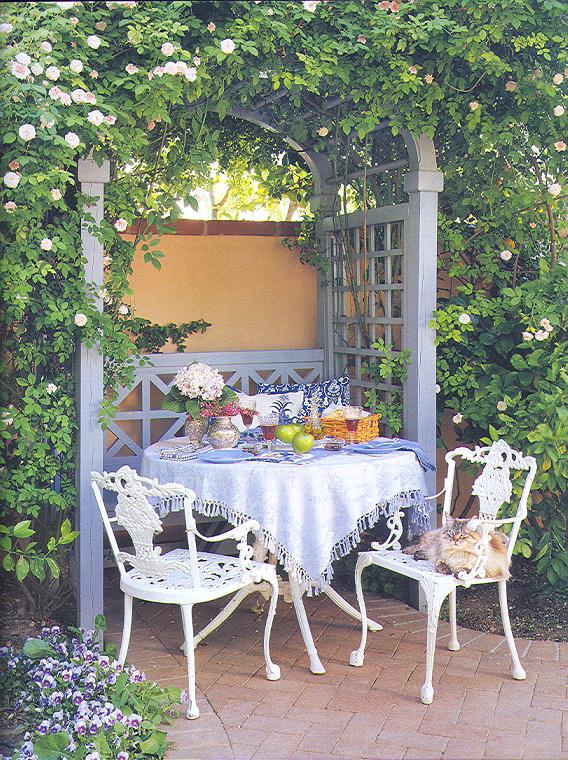
|
LEFT:
Sally Mae, one of Ronstadt's three cats,
relaxes in a shady area in the courtyard. "Her yard is incredible - there are many
unique spots," Martin says. Ronstadt collaborated on the outdoor design with
Harlow Gardens, a family-run landscaping business in Tucson. |
Add to that a steady stream of visitors and relatives. "If you stand on a corner in town
and yell 'Ronstadt,' they'll come running in every direction," says the singer. "The thing
we've always had in common is music. We just get together, and the guitars come out, and
we wind up singing and playing." She's been working on a new jazz album herself, and she
still tours occasionally in the summer when the kids are out of school. But the road has
lost some of its romance. "I'm your basic agoraphobic," she says. "If I don't leave my house
for a week, I'm fine."
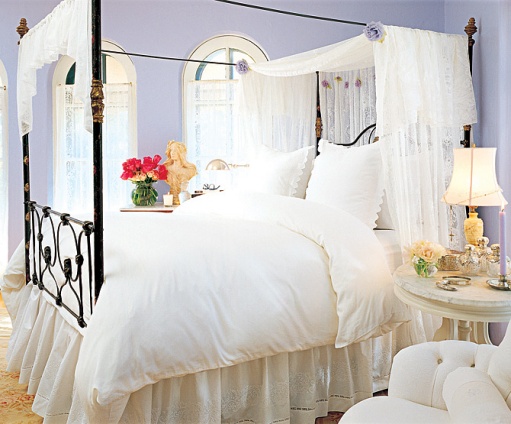
|
LEFT:
"It's the dreamiest room of the house,"
Martin says of the master bedroom. An antique wedding veil was draped over an
iron-and-brass frame. "We upholstered the tufted chair in a nice, but less fancy,
fabric, since Ginger, Linda's Australian shepherd, likes to sleep there." |
RIGHT:
Ronstadt found the courtyard's cast-concrete
fountain in Tucson. "The water attracts tons of birds and butterflies," says Martin. |

|
Return to Articles Page
Return to Home Page
|







 Professionally speaking, the singer has continued to experiment over the last two decades
or so, mastering musical styles from orchestral pop to traditional Mexican. Personally,
however, she's as tradition-bound as they come. Ronstadt has two adopted kids now, and
several years ago the three of
them quit California for Tucson, Arizona. "I decided to raise my children there because
they have more dirt," says Ronstadt, "as opposed to concrete." Tucson is where her father
ran Ronstadt's Hardware, where her grandfather once managed a sprawling cattle ranch and
where, on the remaining 10 acres of that ranch, she grew up. "That sense of place," she
points out, "is something very hard to come by these days."
Professionally speaking, the singer has continued to experiment over the last two decades
or so, mastering musical styles from orchestral pop to traditional Mexican. Personally,
however, she's as tradition-bound as they come. Ronstadt has two adopted kids now, and
several years ago the three of
them quit California for Tucson, Arizona. "I decided to raise my children there because
they have more dirt," says Ronstadt, "as opposed to concrete." Tucson is where her father
ran Ronstadt's Hardware, where her grandfather once managed a sprawling cattle ranch and
where, on the remaining 10 acres of that ranch, she grew up. "That sense of place," she
points out, "is something very hard to come by these days."
 In an old central Tucson neighborhood laid out by a student of Central Park designer
Frederick Law Olmsted, Ronstadt found a pink stucco Mediterranean-style house built by
Roy Place in 1928. "I fell in love with it when I saw it because it had this tile in the
study that reminded me of my father's room in our old house," she says. "And I think I've
met almost everyone that's lived in the house. I know the family that built it and the
daughter of the family that
grew up in it. So it's always felt like a house that was loved." The place was in good
hape when the singer acquired it, but it was slightly cramped after her three-story
residence in San Francisco. "None of my furniture fit. The house has lots of doors and
windows, and I couldn't figure out where to put anything."
In an old central Tucson neighborhood laid out by a student of Central Park designer
Frederick Law Olmsted, Ronstadt found a pink stucco Mediterranean-style house built by
Roy Place in 1928. "I fell in love with it when I saw it because it had this tile in the
study that reminded me of my father's room in our old house," she says. "And I think I've
met almost everyone that's lived in the house. I know the family that built it and the
daughter of the family that
grew up in it. So it's always felt like a house that was loved." The place was in good
hape when the singer acquired it, but it was slightly cramped after her three-story
residence in San Francisco. "None of my furniture fit. The house has lots of doors and
windows, and I couldn't figure out where to put anything."
 Their first project together was redoing the children's bedrooms - Ronstadt's daughter
got a star-spangled ceiling; her son, a cowboy motif. Then they turned their attention
to the singer's own bedroom, placing her bed on the diagonal to make room for a
gingerbread-trimmed mantel that Ronstadt had purchased in L.A. Martin, along with
Tucson-based architect Bob Vint, oversaw construction of a new master bath
(and a breakfast room below), taking pains to see that its arches and tiles and fixtures
matched the period details of the rest of the house.
Their first project together was redoing the children's bedrooms - Ronstadt's daughter
got a star-spangled ceiling; her son, a cowboy motif. Then they turned their attention
to the singer's own bedroom, placing her bed on the diagonal to make room for a
gingerbread-trimmed mantel that Ronstadt had purchased in L.A. Martin, along with
Tucson-based architect Bob Vint, oversaw construction of a new master bath
(and a breakfast room below), taking pains to see that its arches and tiles and fixtures
matched the period details of the rest of the house.